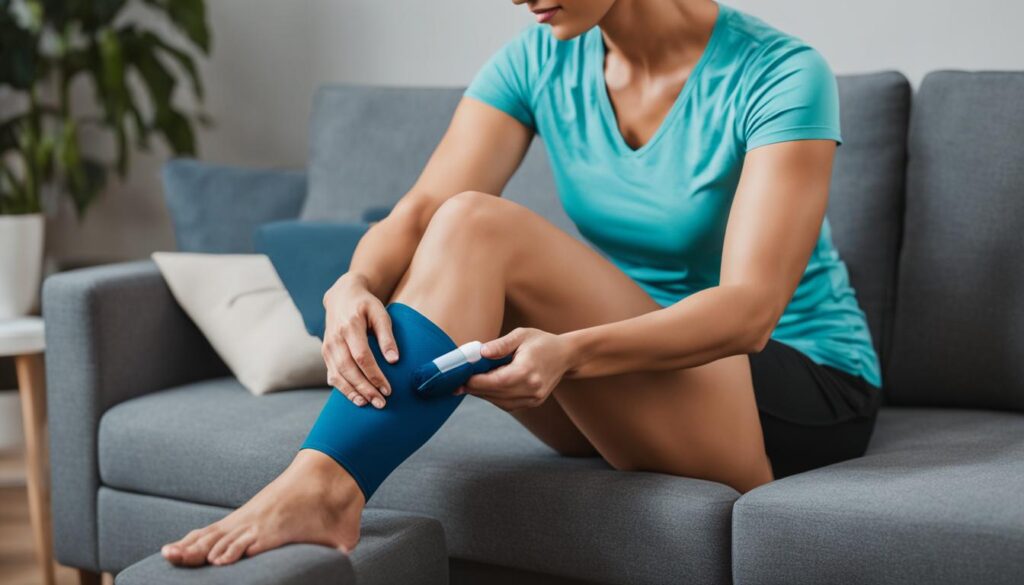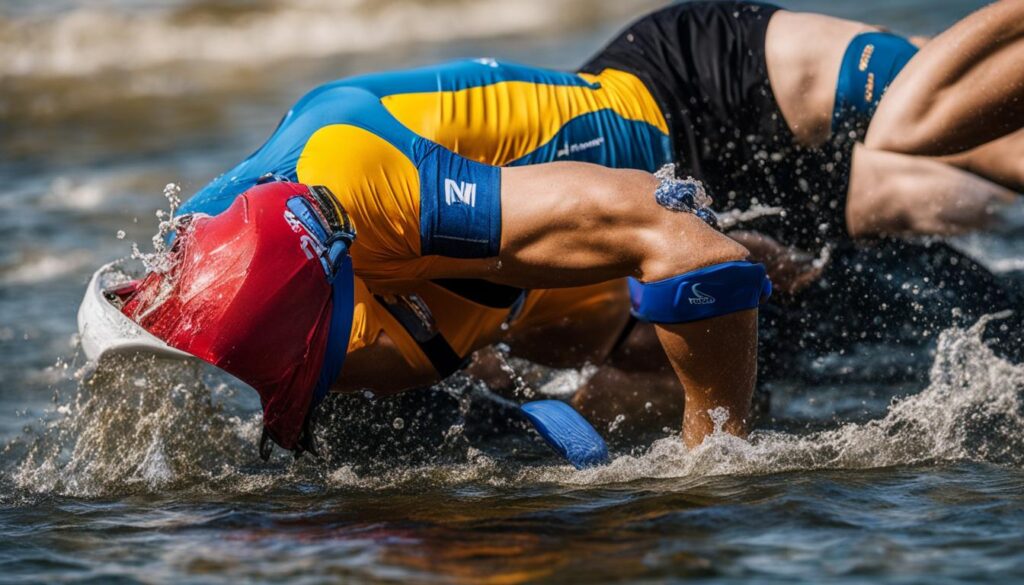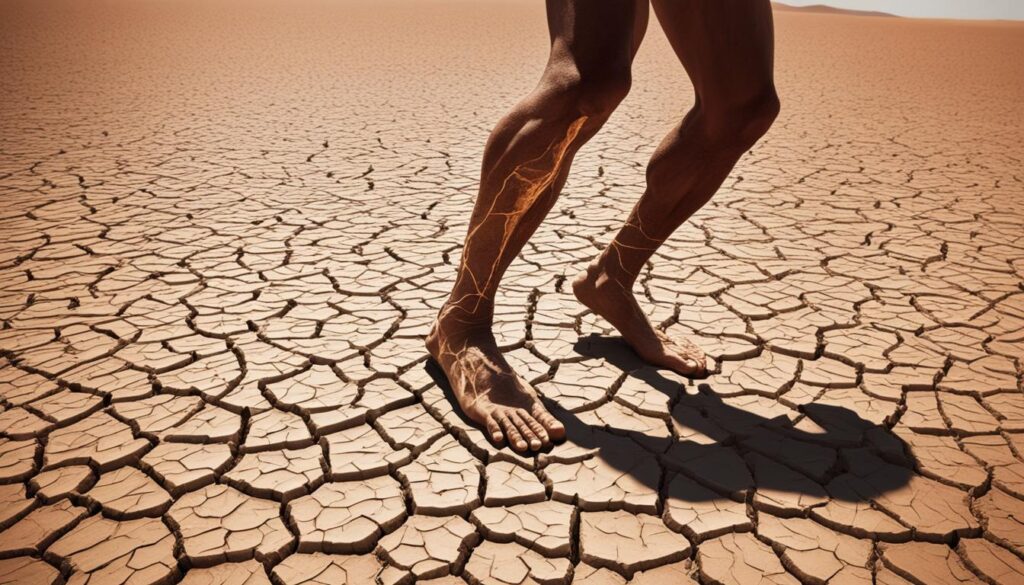Leg cramps can be an uncomfortable and painful experience. If you’re wondering what could be causing them, one possible culprit may be dehydration. When your body doesn’t have enough fluids, it can affect your muscles and make them more prone to cramping. Staying hydrated is essential, especially during physical activity, to prevent leg cramps.
Dehydration isn’t the only cause of leg cramps, though. Overuse, fatigue, excessive sitting or standing, certain medications, potassium deficiency, poor circulation, excessive alcohol use, pregnancy, and multiple sclerosis are all factors that can contribute to leg cramps as well.
Key Takeaways:
- Dehydration is a common cause of leg cramps.
- Staying hydrated, especially during physical activity, helps prevent leg cramps.
- Other factors such as overuse, fatigue, and potassium deficiency can also contribute to leg cramps.
- Identifying and addressing underlying causes is important for preventing and managing leg cramps.
- Stretching, conditioning muscles, and maintaining a balanced diet can help prevent leg cramps.
Dehydration and leg cramps
Dehydration is a leading cause of leg cramps. When the body is dehydrated, the muscles become irritable and more prone to cramping. It’s important to stay hydrated, especially during physical activity, to prevent leg cramps. Drinking enough water is essential for maintaining proper muscle function and avoiding dehydration-related leg cramps.
Did you know that dehydration can significantly increase the risk of experiencing painful leg cramps? When the body lacks sufficient water, it affects the muscles’ ability to function optimally, making them more susceptible to cramping. This can be particularly problematic during physical activity when dehydration occurs more rapidly.
To ensure hydration and reduce the risk of leg cramps, it is recommended to drink water regularly throughout the day, especially before, during, and after exercise or any strenuous physical activities. It is crucial to listen to your body’s thirst signals and not wait until you are extremely thirsty to hydrate.
Proper hydration not only helps prevent leg cramps but also supports overall muscle health. Muscles rely on adequate hydration to receive the necessary nutrients, oxygen, and electrolytes essential for optimal performance. Therefore, maintaining hydration levels is crucial to avoid muscle-related discomfort and enhance physical performance.
Effects of dehydration on muscle function
Dehydration can have detrimental effects on muscle function. When the body lacks water, muscle cells do not receive the adequate water content required for optimal functioning. This can lead to muscle cramps and spasms, causing discomfort and hindering physical performance.
Moreover, dehydration affects the balance of electrolytes in the body, which further contributes to muscle cramps. Electrolytes, such as sodium, potassium, and chloride, play a vital role in muscle contraction and relaxation. When dehydration occurs, these electrolytes become imbalanced, leading to an increased risk of muscle cramps.
It is important to replenish lost fluids and electrolytes during periods of physical activity or exposure to hot weather. Consuming foods or drinks that contain essential electrolytes can help maintain the balance required for optimal muscle function. Electrolyte-rich beverages, such as sports drinks, are specially formulated to replenish lost fluids and electrolytes during intense physical activity.
Hydration plays a crucial role in preventing leg cramps and maintaining overall muscle health. By staying properly hydrated, individuals can reduce the risk of experiencing dehydration-related leg cramps and enhance their physical performance.
Other Causes of Leg Cramps
In addition to dehydration, there are several other common causes of leg cramps. Understanding these underlying factors is crucial for preventing and managing leg cramps effectively.
Muscle Overuse and Fatigue
Overusing the leg muscles or experiencing fatigue can lead to cramping. Engaging in intense physical activities or repetitive movements without proper rest or conditioning can strain the muscles, making them more susceptible to cramps.
Prolonged Sitting or Standing
Sitting or standing for extended periods can cause leg cramps. Maintaining the same position for too long can impair circulation, leading to muscle stiffness and cramping.
Medications
Certain medications, such as diuretics, can cause imbalances in electrolyte levels, leading to muscle cramps. It’s important to consult with a healthcare professional about the potential side effects of any medications you may be taking.
Potassium Deficiency
A deficiency in potassium can contribute to both muscle weakness and cramping. Potassium plays a vital role in facilitating proper muscle function, and inadequate levels can increase the likelihood of experiencing cramps.
Poor Circulation
Conditions that affect blood flow, such as peripheral artery disease, can result in inadequate blood supply to the muscles. This can lead to cramping, particularly during physical activity.
Excessive Alcohol Use
Consuming alcohol excessively can lead to dehydration and electrolyte imbalances, which can trigger muscle cramps. It’s important to drink alcohol in moderation and stay properly hydrated.
Pregnancy
Pregnant individuals often experience leg cramps, especially during the second and third trimesters. The exact cause is not fully understood, but hormonal changes, pressure on nerves, and changes in blood flow may contribute to the occurrence of leg cramps during pregnancy.
Multiple Sclerosis
Multiple sclerosis (MS) is a chronic autoimmune disease that affects the central nervous system. Leg cramps can be a common symptom of MS, resulting from nerve damage and disruption in muscle signaling.
Other Possible Causes
While the above factors are the most common causes of leg cramps, there are other potential triggers, including certain medications, underlying medical conditions, and electrolyte imbalances. Consulting with a healthcare professional can help determine the specific cause of your leg cramps and develop an appropriate treatment plan.
| Causes | Description |
|---|---|
| Muscle Overuse and Fatigue | Engaging in intense physical activities or repetitive movements without proper rest or conditioning can strain the muscles, making them more susceptible to cramps. |
| Prolonged Sitting or Standing | Maintaining the same position for too long can impair circulation, leading to muscle stiffness and cramping. |
| Medications | Certain medications, such as diuretics, can cause imbalances in electrolyte levels, leading to muscle cramps. |
| Potassium Deficiency | A deficiency in potassium can contribute to both muscle weakness and cramping. |
| Poor Circulation | Conditions that affect blood flow can result in inadequate blood supply to the muscles, leading to cramping. |
| Excessive Alcohol Use | Consuming alcohol excessively can lead to dehydration and electrolyte imbalances, which can trigger muscle cramps. |
| Pregnancy | Pregnant individuals often experience leg cramps, especially during the second and third trimesters. |
| Multiple Sclerosis | Leg cramps can be a common symptom of multiple sclerosis (MS), resulting from nerve damage and disruption in muscle signaling. |
| Other Possible Causes | Other factors, such as certain medications, underlying medical conditions, and electrolyte imbalances, can also contribute to leg cramps. |
Preventing leg cramps
To prevent leg cramps, there are several steps you can take. It’s important to stay hydrated throughout the day, especially during physical activity, as dehydration can increase the risk of cramping. Remember to drink enough water and replenish fluids regularly.
Stretching and properly conditioning your leg muscles can also help prevent cramps. Incorporate gentle stretches into your daily routine and consider exercises that target the muscles in your legs, such as calf raises and leg extensions.
Avoiding excessive alcohol consumption is another important factor in preventing leg cramps. Alcohol can contribute to dehydration and imbalances in electrolyte levels, which can increase the likelihood of muscle cramps.
Maintaining a healthy diet that includes foods rich in potassium, such as bananas, can also help prevent leg cramps. Potassium is an essential mineral that helps regulate muscle function. Including potassium-rich foods in your diet can support muscle health and reduce the risk of cramping.
If you’re pregnant, take extra measures to prevent leg cramps during the third trimester. Regular exercise, such as walking or swimming, can help improve circulation and prevent cramps. Additionally, gentle leg and foot massages, as well as regular stretching, can provide relief and reduce the occurrence of cramps.
Simple Steps to Prevent Leg Cramps:
- Stay hydrated by drinking enough water throughout the day.
- Stretch and condition your leg muscles regularly.
- Avoid excessive alcohol consumption.
- Maintain a potassium-rich diet, including foods like bananas.
- Engage in regular exercise and gentle massages during pregnancy.
By following these preventive measures, you can reduce the likelihood of experiencing leg cramps and promote overall muscle health.
| Preventive Measures | Benefits |
|---|---|
| Stay hydrated | Prevents dehydration-induced cramps |
| Stretch and condition leg muscles | Improves muscle flexibility and reduces cramp risk |
| Avoid excessive alcohol consumption | Prevents dehydration and electrolyte imbalances |
| Maintain a potassium-rich diet | Supports muscle health and reduces cramping |
| Engage in regular exercise and gentle massages during pregnancy | Improves circulation and reduces cramps during pregnancy |
Treating leg cramps
If you do experience a leg cramp, there are several measures you can take to alleviate the pain and discomfort.
- Stretching and massaging the affected muscle can help relax the cramp.
- Applying heat or cold therapy, such as using a heating pad or ice pack, can also provide relief.
- Over-the-counter pain relievers can be taken to manage the pain, but it’s best to consult with a healthcare professional for proper guidance on treatment options.
While these methods may help relieve the immediate symptoms of a leg cramp, it’s important to address any underlying causes to prevent future occurrences.
In my experience, regular stretching and massage have been effective in relieving leg cramps. I also find that applying heat to the affected area helps relax the muscle and soothe the pain. However, it’s essential to consult with a healthcare professional to ensure proper treatment and rule out any underlying conditions.

Treating leg cramps involves a combination of self-care measures and medical guidance. By following these methods, you can find relief and improve your overall leg muscle health.
The connection between hydration and muscle health
Proper hydration is crucial for maintaining overall muscle health. When the body is dehydrated, it can have detrimental effects on muscle function and performance. Inadequate hydration can hinder the delivery of essential nutrients, oxygen, and electrolytes to the muscles, increasing the risk of muscle cramps and impairing their optimal function.
Muscles depend on adequate hydration to support their recovery and maintain their proper function. Hydration helps regulate body temperature during exercise, allowing muscles to perform efficiently. It also aids in the removal of waste products produced during muscle metabolism, reducing the risk of muscle fatigue and soreness.
When the body is well-hydrated, it ensures the optimal balance of electrolytes needed for normal muscle contraction and relaxation. Electrolytes such as sodium, potassium, and chloride play a significant role in muscle function. They help transmit electrical signals that control muscle contractions, enabling smooth and coordinated movement.
Here is a table summarizing the effects of hydration levels on muscle health:
| Hydration Levels | Effects on Muscle Health |
|---|---|
| Optimal Hydration | Supports muscle recovery and function |
| Mild Dehydration | Increases the risk of muscle cramps |
| Severe Dehydration | Impairs muscle function and performance |
It is important to note that hydration needs may vary depending on individual factors such as activity level, climate, and overall health. To maintain optimal muscle health, it is recommended to drink enough fluids throughout the day, especially before, during, and after physical activity. Water is the best choice for staying hydrated, but sports drinks can be beneficial for prolonged or intense exercise sessions as they replenish electrolytes lost through sweat.
By prioritizing proper hydration, individuals can support their muscle health, reduce the risk of muscle cramps, and improve overall physical performance.
Effects of dehydration on electrolyte balance
Dehydration can have significant effects on the body’s electrolyte balance and contribute to muscle cramps. Electrolytes, such as sodium, potassium, and chloride, play a crucial role in muscle contraction and relaxation. When the body is dehydrated, electrolyte levels can become imbalanced, leading to muscle cramps and other symptoms.
It’s important to replenish electrolytes by consuming foods or drinks that contain these essential minerals, especially during periods of physical activity or in hot weather. Proper hydration is key to maintaining a healthy electrolyte balance and reducing the risk of dehydration-related muscle cramps.
Here are some common electrolytes and their roles in muscle function:
- Sodium: Sodium helps regulate fluid balance and aids in nerve impulse transmission, including muscle contractions.
- Potassium: Potassium is involved in muscle contraction, nerve function, and maintaining fluid balance within cells.
- Chloride: Chloride works alongside sodium and potassium to regulate fluid balance and supports proper muscle function.
When electrolyte levels are imbalanced due to dehydration, the muscles can be more prone to cramping. Adequate hydration is essential for replenishing these electrolytes and maintaining optimal muscle function.
Quote:
“Electrolyte imbalances caused by dehydration can disrupt muscle function and increase the likelihood of experiencing painful cramps” – Dr. Jennifer Thompson, Sports Medicine Specialist

Conclusion
Dehydration is a common cause of leg cramps, and it’s important to recognize the impact it can have on muscle health. When the body is dehydrated, the muscles become irritable and more prone to cramping. Staying hydrated is crucial for preventing leg cramps, especially during physical activity.
Along with dehydration, factors like overuse, fatigue, and potassium deficiency can contribute to leg cramps. Practicing proper muscle conditioning, such as stretching and conditioning exercises, can help prevent and manage leg cramps. Identifying and addressing underlying causes, such as poor circulation or certain medications, is also essential in managing leg cramps effectively.
Maintaining a balanced electrolyte level is crucial for supporting muscle function. Electrolytes like sodium, potassium, and chloride play a vital role in muscle contraction and relaxation. Replenishing electrolytes through diet or drinks containing these essential minerals is especially important during physical activity or in hot weather.
In conclusion, by staying hydrated, practicing proper muscle conditioning, and addressing underlying causes, you can reduce the risk of experiencing leg cramps associated with dehydration. Remember, maintaining a healthy balance of fluids and electrolytes is key to supporting muscle health and preventing discomfort.
FAQ
Can dehydration lead to leg cramps?
Yes, dehydration is one of the leading causes of leg cramps. When the body is dehydrated, the muscles become irritable and more prone to cramping.
What are the other causes of leg cramps?
Other causes of leg cramps include overuse of leg muscles, fatigue, excessive sitting or standing, certain medications, potassium deficiency, poor circulation, excessive alcohol use, pregnancy, and multiple sclerosis.
How can I prevent leg cramps?
To prevent leg cramps, it is important to stay hydrated by drinking enough water throughout the day, especially during physical activity. Stretching and properly conditioning your leg muscles can also help prevent cramps. Avoiding excessive alcohol consumption and maintaining a healthy diet that includes foods rich in potassium, such as bananas, can also be helpful.
What can I do to treat leg cramps?
If you experience a leg cramp, you can try stretching and massaging the affected muscle to help relax the cramp. Applying heat or cold therapy, such as using a heating pad or ice pack, can also provide relief. Over-the-counter pain relievers can be taken to manage the pain, but it is best to consult with a healthcare professional for proper guidance on treatment options.
What is the connection between hydration and muscle health?
Proper hydration is essential for overall muscle health. Dehydration can affect muscle function and performance, as muscles may not receive the necessary nutrients, oxygen, and electrolytes they need to function optimally. Adequate hydration supports muscle recovery and helps maintain proper muscle function.
How does dehydration affect electrolyte balance?
Dehydration can disrupt the body’s electrolyte balance, which can contribute to muscle cramps. Electrolytes, such as sodium, potassium, and chloride, play a crucial role in muscle contraction and relaxation. When the body is dehydrated, electrolyte levels can become imbalanced, leading to muscle cramps and other symptoms.
How does dehydration specifically affect leg cramps?
Dehydration is a common cause of leg cramps. When the body is dehydrated, the muscles become irritable and more prone to cramping. Staying hydrated and addressing underlying causes can help prevent and manage leg cramps.
What are the effects of dehydration on leg cramps?
Dehydration can lead to muscle cramps and affect muscle function. It is important to recognize the connection between hydration and muscle health to reduce the risk of leg cramps associated with dehydration.





